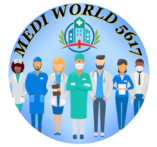CARDIAC DEPARTMENT'S DOCTORS
In a cardiac department, several types of doctors specialize in various aspects of heart care. Each has specific training and expertise related to different heart conditions and treatments. Here are the key types of doctors you may find in a cardiac department:
1. Cardiologist
General Cardiologists: These are physicians trained in the diagnosis and treatment of heart diseases. They manage common heart conditions such as hypertension, coronary artery disease, heart failure, and arrhythmias.
- Role: They conduct diagnostic tests, provide medical management, prescribe medications, and guide patients on lifestyle changes to manage heart disease.
- Specialties within Cardiology:
- Non-invasive cardiologists: Specialize in diagnostic tests such as ECG, echocardiography, stress tests, and Holter monitoring.
- Invasive cardiologists: Involved in procedures like angioplasty, stenting, and catheterization, focusing on interventions for coronary artery disease.
2. Interventional Cardiologist
- Role: Interventional cardiologists perform procedures to treat heart conditions without surgery, using catheter-based techniques. They treat blockages in the arteries (such as performing angioplasty and inserting stents) and other conditions like congenital heart defects or heart valve issues.
- Key Procedures:
- Angioplasty (balloon procedure to open blocked arteries).
- Stent placement.
- Coronary angiography.
- Cardiac catheterization.
3. Electrophysiologist (Cardiac Electrophysiologist)
- Role: These cardiologists specialize in diagnosing and treating electrical disorders of the heart, such as arrhythmias (irregular heartbeats).
- Key Procedures:
- Ablation: A procedure to destroy the tissue causing abnormal heart rhythms.
- Pacemaker implantation: To regulate heartbeats.
- Implantable cardioverter-defibrillator (ICD) placement.
- Electrophysiology studies to evaluate electrical activity in the heart.
4. Cardiac Surgeon (Cardiothoracic Surgeon)
- Role: Cardiothoracic surgeons specialize in surgical interventions for heart diseases, including heart bypass surgery, valve repair or replacement, and heart transplants.
- Key Procedures:
- Coronary artery bypass grafting (CABG).
- Heart valve repair or replacement (e.g., aortic, mitral valves).
- Heart transplants.
- Aneurysm repair and other major heart surgeries.
5. Pediatric Cardiologist
- Role: Pediatric cardiologists specialize in diagnosing and treating heart conditions in children, including congenital heart defects (present at birth) and arrhythmias.
- Key Conditions Treated:
- Congenital heart defects.
- Pediatric arrhythmias.
- Kawasaki disease.
- Cardiac issues arising from genetic conditions.
6. Heart Failure Specialist
- Role: These cardiologists focus specifically on patients with heart failure, a condition in which the heart is unable to pump blood efficiently.
- Key Responsibilities:
- Diagnose and manage various stages of heart failure.
- Prescribe medications like ACE inhibitors, beta-blockers, and diuretics.
- Recommend lifestyle modifications and interventions such as left ventricular assist devices (LVADs) or heart transplants.
7. Cardiac Rehabilitation Specialist
- Role: These doctors (often with expertise in physical medicine or exercise physiology) specialize in helping patients recover and improve their heart health after surgery, a heart attack, or other cardiovascular issues.
- Key Responsibilities:
- Design exercise and lifestyle programs for patients recovering from heart conditions.
- Provide education on diet, smoking cessation, and managing stress.
8. Preventive Cardiologist
- Role: A preventive cardiologist focuses on reducing the risk of heart disease before it occurs, particularly for individuals with risk factors such as high cholesterol, hypertension, diabetes, and a family history of heart disease.
- Key Responsibilities:
- Educating patients about lifestyle changes (diet, exercise).
- Managing risk factors (e.g., controlling blood pressure, cholesterol).
- Providing early interventions to prevent the development of heart disease.
9. Cardiovascular Imaging Specialist
- Role: These doctors specialize in using imaging techniques like echocardiography, MRI, CT scans, and nuclear medicine to diagnose heart conditions.
- Key Responsibilities:
- Interpreting images from diagnostic tests.
- Helping with the diagnosis of conditions like valve disease, coronary artery disease, and heart muscle dysfunction.
10. Cardiovascular Pathologist
- Role: Cardiovascular pathologists specialize in the examination of tissue samples from the heart and blood vessels, typically to diagnose diseases and conditions at a cellular level.
- Key Responsibilities:
- Diagnosing diseases from biopsies or post-mortem examinations.
- Assisting in the diagnosis of conditions like heart muscle diseases, infections, and vascular diseases.
Summary
These specialists work collaboratively within the cardiac department to provide a comprehensive range of care, from prevention and diagnosis to treatment and rehabilitation of heart conditions. Their roles often overlap, and in some cases, a patient may need to see multiple specialists for coordinated care.
